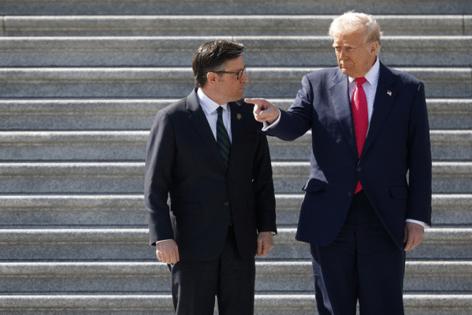Congress now faces an $880 billion Medicaid question
Published in Political News
WASHINGTON — The House cleared a hurdle Thursday in adopting a budget resolution needed for filibuster-proof legislation on President Donald Trump’s policy priorities. But now, another obstacle stands in the way: how to find $1.5 trillion in spending cuts without cutting Medicaid benefits, as Trump and House leadership have promised.
The budget resolution directs the House Energy and Commerce Committee to find $880 billion in savings — a feat that would prove extremely difficult without making deep cuts to Medicaid, the massive health program covering 72 million Americans, including low-income adults, children and people with disabilities.
Some Republicans say they won’t support legislation that would cut the program.
“If they’re going to cut qualified, legal people, whether they’re disabled, whether they’re senior citizens, whether they’re working poor … we’re not supporting that. Period,” said Rep. Jeff Van Drew, R-N.J., who along with a dozen other Republicans met with Speaker Mike Johnson earlier this week to emphasize their objections to Medicaid benefit cuts.
House health leaders met Thursday morning to discuss proposals that could gather enough support. But after that meeting, they did not appear to have agreed to any firm solutions other than instituting work requirements, which would not generate anywhere near the $880 billion in cuts the Energy and Commerce Committee is being assigned.
“We’re throwing mud against the wall,” said Georgia Republican Rep. Earl L. “Buddy” Carter, who chairs the Energy and Commerce Health Subcommittee, adding that House health leaders plan to meet again after the coming two-week recess. “We’re getting there.”
Johnson argues much of the savings in Medicaid can be found by eliminating fraud, waste and abuse. He and others have also floated legislation that would prevent undocumented people from accessing Medicaid. Current law largely prevents federal funding from covering undocumented individuals, but some states, like California, have expanded coverage using state funding.
Undocumented immigrants can also still receive emergency medical care through a program called “emergency Medicaid services.” The federal government spent about $18 billion on that program between 2017 and 2023, according to the Congressional Budget Office.
“We’re going to protect the benefits that everyone is legally entitled to. The beneficiaries who have a legal right to that — it will be preserved,” Johnson said.
“We have a lot of fraud, waste of use in Medicaid,” he added, saying Republicans would work with the White House Department of Government Efficiency to “carve out and find these savings.”
Ideas that have generally found support from Republicans include work requirements and ensuring people are not receiving Medicaid benefits illegally. Still, finding $880 billion in savings would likely require deeper cuts to Medicaid.
Republicans representing districts in states that expanded Medicaid under the 2010 health care law known as Obamacare to cover more low-income adults have been the most vocal about potential cuts.
Forty states and the District of Columbia have expanded Medicaid, with about 20 million people in that group. Much of the rhetoric from conservatives has been whether the federal government should continue paying 90% of the costs to cover that population, as laid out in the 2010 health care law, when the federal government actually pays a lesser share to cover the “traditional” Medicaid population.
But any cuts to that federal share would essentially shift cuts to state governments, forcing leaders there to make tough decisions about coverage and cuts.
Van Drew said he wouldn’t support that, either.
“If there are folks on the other side of this that want to hurt people, that want to cut to the bone, we’re not voting for it,” Van Drew said.
Still, Van Drew said he could support other Medicaid policies that could generate savings, including work requirements and requiring states to do more frequent verification of benefit eligibility. He also floated a potential limitation on future enrollment growth but nothing that would impact “current recipients.”
“Existing people, even if they’re part of the expansion, should be OK. That’s what we’re saying. If they’re not, we’re not supporting it,” he said.
There could be “guardrails” for the future, he said.
“That doesn’t mean [enrollment] is not going to grow,” he said. “But we got to rein it in somewhat.”
In the Senate, Republicans including Josh Hawley of Missouri, Susan Collins of Maine and Lisa Murkowski of Alaska have publicly doubted how $880 billion in savings could be found without cutting deep into Medicaid.
“I just want to know, at the end of the day, whatever reforms or package of things are proposed, will it result in reductions in benefits to Missourians? That’s my test,” Hawley said.
©2025 CQ-Roll Call, Inc., All Rights Reserved. Visit cqrollcall.com. Distributed by Tribune Content Agency, LLC.




























































Comments